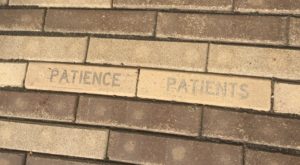May 31st, 2017
Curing the Toxic Culture: First, Honor Thy Patient
Harrison Reed, PA-C
In March I wrote a blog post for In Practice that detailed some of the devastating effects of a toxic workplace culture. It’s worth a read, but the main points are easily summarized: abusive environments in medicine affect nearly every aspect of professional performance and hurt both businesses and patients. They lead to lower productivity, higher absenteeism and turnover of employees, and decreased patient satisfaction. At least one large study has even linked poor workplace culture to higher patient mortality.
But I pulled a nasty trick in that last entry. I showed you a problem — and hopefully elicited some level of concern — and then dropped the mic without offering a solution. There’s a good reason for that: I don’t have one.
If there were one easy answer to fix healthcare culture, I would bottle it and travel the country selling it out of the trunk of my car. But in reality the cure for the culture is likely multi-faceted, a million small drops in an enormous bucket. Facing an insurmountable task, however, is no reason to procrastinate. There are some things we can do right now to start filling the bucket.
Step #1 starts with the most obvious but often obfuscated part of the equation: our patients. We can’t expect to treat each other better if we don’t first respect our common mission. The following ideas may prime the pump for a better patient care environment.
The Right Address
A name is often the first thing you learn about a patient when you pick up a chart or knock on an exam room door. How we address patients, to their faces or among ourselves, sets the tone for the entire relationship.
“When did our patients stop being ladies and gentlemen?” I remember one of my favorite physicians asking a room of students during my training. A respectful title might be the only way someone maintains dignity after he dons a faded hospital gown. Default to “sir” or “ma’am” or the respectful cultural analog. If patients later want you to call them by their first name or their nickname or their Twitter handle, leave that to their discretion.
Even with the best of intentions, few things are as condescending as calling an adult stranger “Honey,” “Sweetie,” or “Dear.” Early in my career I made this mistake, thinking it would comfort my patient as her blood pressure plummeted and she neared cardiac arrest. With her last few seconds of consciousness she turned to me and said, “That’s ‘ma’am’ to you.”
She was right.
They’re Listening
Regardless of their clinical condition, assume your patients are listening to you. They probably are. Exam room curtains aren’t soundproof and endotracheal tubes don’t block tympanic membranes. Even sedated patients are often aware of their surroundings. And families walking through the halls definitely are.
Speak to — and about — patients as if they can hear you at all times. Sure, it might look silly when you update an unresponsive person on his care plan or talk a sedated patient through a procedure. But some of you have probably discussed your dating woes with your pet cat, so you can certainly manage this.
Talk Nerdy
Conversations with patients and families represent a minefield rife with opportunities for miscommunication. Clinicians who spit out too much medical jargon can leave laypeople dazed and confused. Conversely, dumbing down a subject below your patient’s understanding can add insult to injury.
While we are often taught to limit medical terminology in discussions with patients, I like to use it and then quickly define or explain it. This covers both of the above scenarios, and the quick education can inoculate your patient against the next clinician who comes in flinging technical terms.
Incremental changes can, over time, increase the sense of professional pride in your workplace. The kindness you show your patients is much more likely to translate to respect among your colleagues. It’s a small but important step toward curing the toxic culture.





To the life boats – but don’t forget about the ship!
I have always found it odd to call a new patient by their first name. . Seems elitist to enter a room and say “hello Barbara, I am Dr. so and so. Similarly, young nurses doing this without permission to a 70 yo woman seems presumptuous.
you are totally right :”Honey” If we want the patient to be respectful we have to consider him (her ) as a human being. Furthermore this is an important part of the treatment.
prefer “this patient suffers from a diabetes” instead of ” this patient is diabetic”
sugar-honey!
many thanks for your always well fited and instructive blogs.
Jean-Pierre. From Paris France.